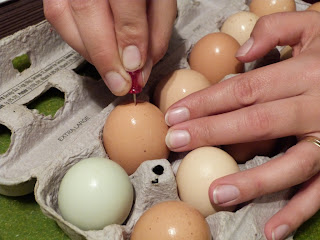Although we're fortunate enough to have plenty of excitement and unpredictability in our lives, many days here on the urban farm fall into a comfortable, familiar routine. We go to our day jobs, spend 8 or more hours doing whatever it is that engineers do, come home, gather fresh eggs, and prepare dinner. Oh, wait... That may be our routine these days, but of course the egg part is sort of new, not to mention unusual for city dwellers like us. Our chickens are just so easygoing and low-maintenance that they've become part of our new normal with hardly a second thought.
Part of that may be because we see them every day, but it's been a little while since we've shared any chicken news here on the blog. As you can see in the picture, they've continued to get bigger, and the coloration of some (particularly the Easter Eggers) has changed slightly. But they're still very much the same in temperament. They like to beg for and devour pretty much anything we give them, from the storebought chicken treats to old kitchen scraps to the bugs we want to get out of the garden. And they loved scratching and pecking at the fresh grass in the photo, from the chicken run addition we put on a few weeks ago.
As fun as the chickens are to watch, we got them for a more practical reason: eggs! And in that area they sure haven't disappointed. From the mention last month of our first egg, production has steadily ramped up to the point where we now expect 6 to 8 eggs to be laid each day. Some days every single hen lays an egg and we have nine! From day one to today, we've gathered a whopping 286 eggs.
Now, we both like eggs, but that's a heck of a lot for us to eat. In addition to giving them to neighbors and friends, we've found that keeping a stash of hard-boiled eggs helps use them up. A quick breakfast when we're running late, or chopped up on a salad for lunch, it's just a great thing to have around. But hard boiling farm fresh eggs is more difficult than you might think. You see, we're trying to boil our eggs within days of harvest, whereas a grocery store egg has sat for a few weeks before it even gets to you. This allows some separation to occur between the shell and the membrane inside, so the peeling process goes better.
A really fresh egg doesn't have that gap, so when it comes time to peel after boiling, the shell sticks to the outside of the egg white, and you end up tearing up a lot of egg trying to get the shell off. So, what to do? The secret is to help create that separation yourself. That way you can enjoy fresh eggs without the frustration of a "bad peeler." Here's how we do it.
Use an ordinary pushpin, and poke a hole into the fat end (not the pointy end) of each egg you want to hard boil. This is the scariest step, because the first time you'll feel sure that you're going to shatter the egg. At least, we did. But if you keep up gentle pressure, possibly while rotating the pin back and forth a bit, you'll end up punching just through the shell and not through the membrane. Another reason to like pushpins for this step is that you can usually just push down all the way to the hilt of the pin, and the hole ends up being that proper depth. Sometimes it may push just into the white, but that's actually okay too.
Here's what a half-dozen prepared eggs looks like. You may have to look pretty closely, but you can see the tiny pinhole in each one. Now they're ready to boil! Everyone seems to have a slightly different method for doing this, but here's ours: Bring a pot of water to a boil, place the eggs in using a slotted spoon, bring the water back up to a boil if the eggs have cooled it, then cover the pot and let it sit for 15 minutes. There's actually enough heat in the water at that point to perfectly cook the eggs, and you don't have to keep using gas or electricity to heat it any further.
We mentioned that it's possible the pushpin will poke into the egg white in some instances. Well, again, that's nothing to worry about. You'll just notice a thin ribbon of white stream out of the hole for a bit, then it will separate off and float around in the pot. That small portion of egg is lost, but it's really an insignificant amount, and once it separates away, that should be all of it. The peeled egg may have a small depression in that area, but it's truly worth the risk because...
The eggs will peel perfectly! Here's a batch of ours, following the procedure we just went over. Each one was an absolute dream to peel, especially after the struggles we've had before we discovered this method. We've been happy for a long time to be gathering fresh eggs from our backyard chickens, but it makes it even more rewarding when we can enjoy them that much easier. We've seen a lot of so-called "guaranteed" methods to hard boil eggs, but this is the only one that's worked consistently for us. Give it a try next time you've got some fresh, local eggs, and enjoy!






No comments:
Post a Comment